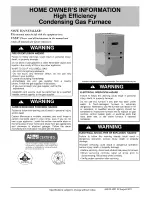
16
Vent (Single Pipe) Piping - Vent/Flue Pipe Terminations
for spe-
cific details on termination construction.
Although
non-direct
vent
installations do not require a combus-
tion air intake
pipe
, a minimum of one 90° elbow should be at-
tached to the furnace’s combustion air intake
if
: an upright instal-
lation uses the standard intake location, or a horizontal installa-
tion uses the alternate air intake location. This elbow will guard
against inadvertent blockage of the air intake.
V
ENT
/F
LUE
P
IPE
L
ENGTHS
AND
D
IAMETERS
Refer to the following table for applicable length, elbows, and
pipe diameter for construction of the vent/flue pipe system of a
non-direct vent installation. In addition to the vent/flue pipe, a
single 90° elbow should be secured to the combustion air intake
to prevent inadvertent blockage. The tee used in the vent/flue
termination must be included when determining the number of
elbows in the piping system.
Pipe
Size
(4)
(inc.)
2
3
4
5
6
7
8
045_3
2
68
65
62
59
56
53
50
070_3
2
68
65
62
59
56
53
50
070_4
2
46
43
40
2
16
13
10
3
68
65
62
59
56
53
50
090_5
3
68
65
62
59
56
53
50
115_5
3
68
65
62
59
56
53
50
Non-Direct Vent (Single Pipe)
Maximum Allowable Length of Vent/Flue Pipe (ft)
(1) (2)
Number of Elbows
(3) (5)
Models
(kBtu_Tons)
090_4
Not Recommended
1) One 90° elbow should be secured to the combustion air intake con-
nection.
2) Minimum requirement for each vent pipe is five (5) feet in length and
one elbow/tee.
3) Tees and/or elbows used in the vent/flue termination must be included
when determining the number of elbows in the piping system.
4) 3” diameter pipe can be used in place of 2” diameter pipe.
5) Increased Clearance Configurations using (2) 45 deg. Long Sweep
elbows should be considered equivalent to one 90 deg. elbow.
V
ENT
/F
LUE
P
IPE
T
ERMINATIONS
The vent/flue pipe may terminate vertically, as through a roof, or
horizontally, as through an outside wall.
Vertical vent/flue pipe terminations should be as shown in the
following figure. Refer to
Section IX, Vent/Flue Pipe and Com-
bustion Air Pipe - Termination Locations
for details concerning
location restrictions. The penetration of the vent through the roof
must be sealed tight with proper flashing such as is used with a
plastic plumbing vent.
Horizontal vent/flue pipe terminations should be as shown in the
following figure. Refer to
Section IX, Vent/Flue Pipe and Combus-
tion Air Pipe - Termination Locations
for details concerning loca-
tion restrictions. A 2 3/8” diameter wall penetration is required for
2” diameter pipe while a 3 1/2” diameter hole is required for 3”
diameter pipe. To secure the pipe passing through the wall and
prohibit damage to piping connections, a coupling should be in-
stalled on either side of the wall and solvent cemented to a length
of pipe connecting the two couplings. The length of pipe should
be the wall thickness plus the depth of the socket fittings to be
installed on the inside and outside of the wall. The wall penetra-
tion should be sealed with silicone caulking material.
In a basement installation, the vent/flue pipe can be run between
joist spaces. If the vent pipe must go below a joist and then up
into the last joist space to penetrate the header, two 45° elbows
should be used to reach the header rather than two 90° elbows.
Counterflow
units.
Remove plastic plug from alternate combustion air intake
location. Relocate and install plug in standard air intake
location (basepan). Plug the remaining hole in the blower
deck with the plastic plug included in the drain kit bag.
4.
Upflow
and
Counterflow
units.
With the gasket facing the cabinet side panel, and the
flange’s flat spot facing forward, secure the combustion
air intake coupling to the cabinet using the screws removed
in step 1 or with field-supplied 3/8” #8 self -drilling screws.
CAUTION
B
E SURE NOT TO DAMAGE INTERNAL WIRING OR OTHER COMPONENTS WHEN
REINSTALLING COUPLING AND SCREWS.
5.
Upflow
and
Counterflow
units.
For
non-direct vent installation
s
installed
horizontally
, a
minimum of one 90° elbow should be installed on the
combustion air intake coupling to guard against inadvertent
blockage. No elbow is required on the alternate
combustion air intake of
upright
installations, however, a
minimum clearance of 2 inches is required to assure
proper air supply.
6.
Upflow
and
Counterflow
units.
For
direct vent installations
, secure field-supplied
combustion air intake pipe directly to the air intake coupling.
NOTE:
A PVC coupling or elbow is required on counterflow
units.
ADDITIONAL
PLUG FROM
DRAIN KIT
SECURE
TO CABINET
UPFLOW/HORIZONTAL SHOWN
(COUNTERFLOW SIMILAR)
REMOVE
3 SCREWS
REMOVE
4 SCREWS
REMOVE
4 SCREWS
REMOVE
AND
RELOCATE
.
REMOVE
AND
RELOCATE
REMOVE
AND CUT
REMOVE
UPFLOW
COUNTERFLOW
5
4
1
2
2
3
3
1
1
3
2" CLEARANCE
REQUIRED
(NON-DIRECT
VENT)
5
Alternate Combustion Air Intake Location
N
ON
-D
IRECT
V
ENT
(S
INGLE
P
IPE
) P
IPING
Non-direct
vent
installations require only a vent/flue pipe. The
vent pipe can be run horizontally with an exit through the side of
the building or run vertically with an exit through the roof of the
building. The vent can also be run through an existing
unused
chimney; however, it must extend a minimum of 12 inches above
the top of the chimney. The space between the vent pipe and the
chimney must be closed with a weather-tight, corrosion-resistant
flashing. For details concerning connection of the vent/flue pipe
to the furnace, refer to
Section IX, Vent/Flue Pipe and Combustion
Air - Standard Furnace Connections or Alternate Furnace Con-
nections
for specific details. Refer to the following
Non-Direct
















































